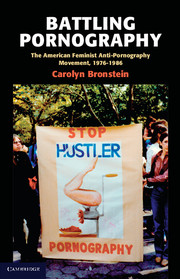Book contents
- Frontmatter
- Contents
- List of Figures
- Acknowledgments
- Introduction: Battling Pornography
- 1 Seeds of Discontent
- 2 Male Violence and the Critique of Heterosexuality
- 3 Have You Seen Deep Throat Yet?
- 4 “I'm Black and Blue from the Rolling Stones and I Love It!”
- 5 Something Inside Me Just Went “Click”
- 6 Growing Pains
- 7 Porn Tours
- 8 The New Lay of the Land
- 9 Anti-Pornography Comes Undone
- Conclusion: Porn Is Here to Stay
- Bibliography
- Index
- References
8 - The New Lay of the Land
WAP Assumes Leadership of the Movement and Faces Challenges from Within and Without
Published online by Cambridge University Press: 05 June 2012
- Frontmatter
- Contents
- List of Figures
- Acknowledgments
- Introduction: Battling Pornography
- 1 Seeds of Discontent
- 2 Male Violence and the Critique of Heterosexuality
- 3 Have You Seen Deep Throat Yet?
- 4 “I'm Black and Blue from the Rolling Stones and I Love It!”
- 5 Something Inside Me Just Went “Click”
- 6 Growing Pains
- 7 Porn Tours
- 8 The New Lay of the Land
- 9 Anti-Pornography Comes Undone
- Conclusion: Porn Is Here to Stay
- Bibliography
- Index
- References
Summary
At the end of 1979, WAP was the dominant organization in a national movement increasingly focused on pornography. This transition was aided by internal shifts within WAVAW and WAVPM, particularly the loss of charismatic organization leaders, which diminished the capacity of the older groups to participate on the national stage and to influence movement direction. With Julia London stepping down from WAVAW and Laura Lederer leaving WAVPM, leadership of the anti-media violence movement fell to WAP. In the years following the East Coast conference and the March on Times Square, WAP became well known as an influential feminist organization speaking out on behalf of women. “Every feminist in the New York metropolitan area has heard of Women Against Pornography,” the author Paula Webster observed in 1981. Indeed, WAP had attracted attention not only in New York, but also throughout the country for its commitment to fighting pornography. During this period, WAP actively sought media attention and tried to communicate a specifically feminist (as opposed to conservative-moralist) objection to pornography, namely that it was a point on the continuum of male violence and functioned as a key mechanism in the subordination of women. Pornography taught women to accept and even desire domination and objectification, and men to deny women's autonomy and subjectivity. Pornography actively reduced women to sexual objects ripe for humiliation and abuse.
- Type
- Chapter
- Information
- Battling PornographyThe American Feminist Anti-Pornography Movement, 1976–1986, pp. 238 - 278Publisher: Cambridge University PressPrint publication year: 2011



